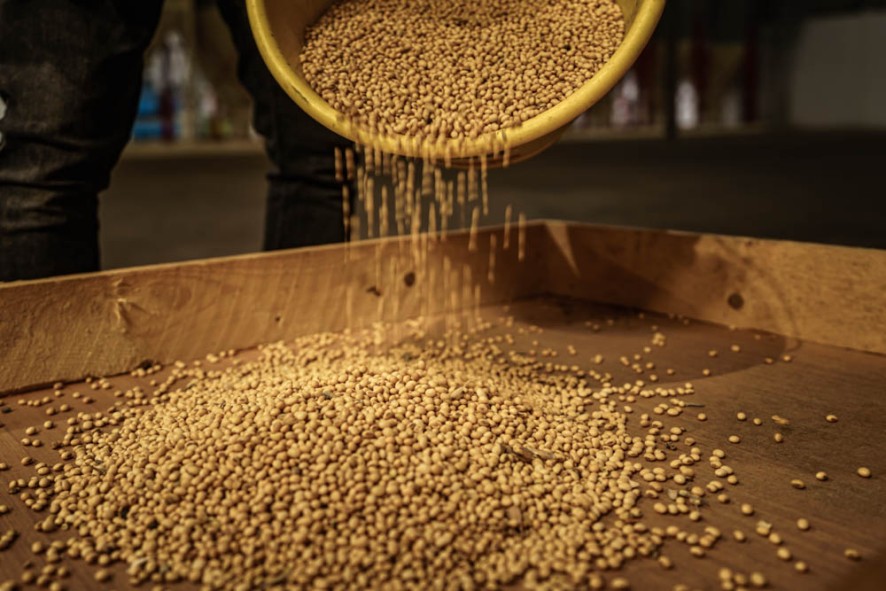We have the solutions to address our protein dependency
Author
Jean-Philippe Puig
CEO of Avril SCA
As an article in Les Echos Week-End recently pointed out, the “yellow gold” that is rapeseed “has the advantage of producing seeds that are as rich in protein as soybeans after oil extraction.” More broadly speaking, oilseeds and protein crops are effective contributors to meeting today’s challenges, namely, global warming and population growth.
Confronted with these challenges, it is our responsibility to seek solutions that will allow us to feed nearly 10 billion people in 2050, while producing more and better with limited resources.
This twofold challenge must be addressed by all key players in the agri-food industry, and even more so by Avril, a company committed to agricultural, food and environmental transitions. Since the Group was founded in 1983, our mission has not changed: “to develop the oil and protein sector in order to feed People and preserve the Planet.”
The strain on the world food market is obvious. Given the demographic curve and changes in consumption, we are moving towards an unavoidable world deficit in proteins. This situation will particularly impact areas that import a lot of food. One such area is Europe, which depends on the rest of the world for more than 60% of its needs.
First of all, we need to encourage more local production. This trend is already taking shape with the development of rapeseed and sunflower cultivation in Europe, but it is still insufficient. The development of non-GMO soy in recent years has also contributed to this trend. It is also the ambition of the French public authorities, through the 120-million-euro “Protein Plan”, to support the agricultural transition in its modernization and diversification, with the development of legume crops (peas, lentils, beans). This ambition also extends to the European level, as shown by the decisions made as part of the new common agricultural policy, to reduce Europe’s dependence on protein imports. For example, Europe imports more than 30 million metric tons of soybeans per year, i.e., 10% of world production. France has been able to structure its sectors; it imports only 4 to 5 million metric tons per year, or 1.5% of global production.
Secondly, we need to produce better. We must find economic models that ensure a fair distribution of value, from the farmer to the consumer. For example, in 2020, Saipol, a subsidiary of Avril, launched a rapeseed purchasing platform – OleoZE – which allows us to move from a punitive environmental dynamic (“I penalize polluters”) to systems that encourage cultivation practices that store carbon in the soil (“I remunerate the contributors”). In 2020, OleoZE recovered more than 80,000 tons of rapeseed and sunflower seeds through conservation agriculture practices and paid the farmers involved in this approach through a bonus on the price paid for the seeds.
In this way, we are making a real contribution to the efforts needed to protect the planet, develop local food production and engage in the energy transition.
Rapeseed can be used to produce new energy sources, while reducing greenhouse gas emissions by 60% compared to petroleum. Soon, nearly 4,000 trucks across France will be running on 100% French rapeseed with Oleo100. A new 100% plant-based, renewable and traced energy, this biofuel can be used as a substitute for diesel and is a great way to promote the French rapeseed industry.
Producing better and more locally are two essential priorities, but they will not be enough: we must also innovate to meet the growing needs of consumers for plant proteins. The consumption of these proteins is increasing by more than 10% per year in Europe. This is a challenge that can only be faced through an ambitious innovation policy.
This is already being demonstrated in very tangible ways. For example, at the beginning of 2022, we will launch the world’s first food protein from rapeseed, in partnership with DSM, a major company specializing in health, nutrition and sustainable lifestyles. The factory is being built in Dieppe, France. This is a world first for industry, and a further step towards protein autonomy for France and Europe.
These solutions are practical and sustainable. They make me optimistic about our ability to continue to feed a growing population while being respectful of the environment. This is what we are all about: “Serving the Earth.”
